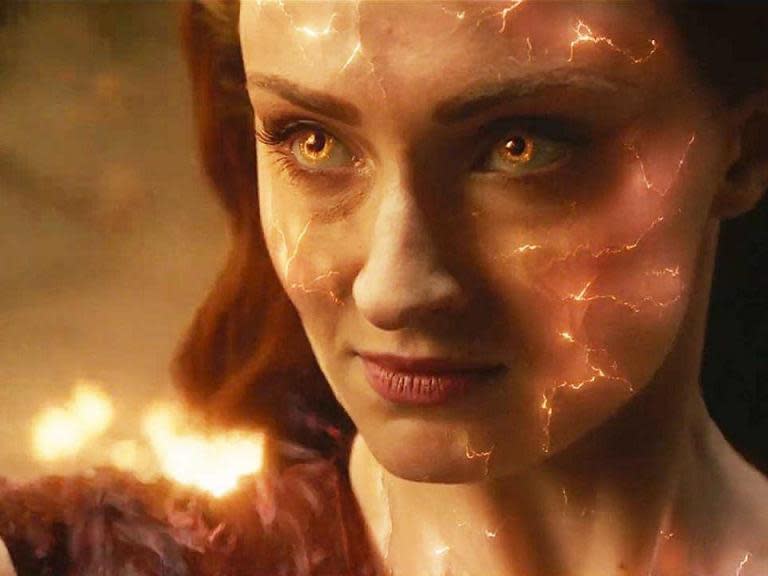X-Men: Dark Phoenix review: A superficial disappointment with nothing fresh to say
Dir: Simon Kinberg; Starring: Sophie Turner, Jennifer Lawrence, Michael Fassbender, James McAvoy, Nicholas Hoult. Cert 12A, 113 mins
The latest X-Men film risks short-circuiting thanks to its own overabundance of special effects. The many scenes of characters being consumed by fireballs or crumbling to dust or being hurled backwards by the lightning-like force in the X-Men’s fingertips become increasingly dreary. This is a young adult drama as much as it is a sci-fi film but doesn’t have anything very fresh to say about the trauma of adolescence as experienced by mutant superheroes.
Jean Grey (Game of Thrones’ Sophie Turner) is the troubled, flame-haired heroine. Jean (aka Dark Phoenix) is first seen as a child in a flashback in 1975, siting in the back of her parents’ car. Her telekinetic powers cause the radio to jump channels and end up provoking one of those slow motion crashes in which the shattered glass falls like confetti on the passengers’ heads as the vehicle performs somersaults.
With her special powers, it is only to be expected that Jean (played as a child by Summer Fontana) will soon be enrolled in the Hogwarts-like school for gifted youngsters run by the wheelchair-bound Charles Xavier/Professor X (James McAvoy). No sooner is she settled here than we are whisked forward in time to 1992. Raven (Jennifer Lawrence) is leading a crew of young daredevils on a mission to rescue some astronauts. During the trip, Jean is engulfed in the middle of a solar flare. This both enhances her powers and gives her a cosmic case of personality disorder. She becomes “all desire, all rage and all pain” and can no longer contain her emotions. She has father issues, her hormones are running wild and she is about to evolve into the “greatest force in the galaxy”.
Raven doesn’t like the way that Charles is sucking up to the political establishment, going for dinners with the president even as he puts the lives of the X-Men at risk. Charles explains that by getting the X-Men accepted as heroes, he is overturning the suspicion that many of the humans still feel towards these mutants in their midst.
Writer-director Kinberg tries to address the gender imbalance implicit in the title of the film. This may be an X-Men story but the women (as Raven is quickest to point out) are invariably doing the rescuing. There are also veiled references to President Trump’s immigration policies. When security is threatened, the politicians waste no time at all in setting up mutant internment centres.
The film delves briefly into metaphysics. “Who are we?” a sonorous voice over asks at the start. “Are we simply what others want us to be? Are we destined to a fate beyond our control?” However, such profound questioning seems altogether irrelevant once the goodies start zapping the baddies.
One major disappointment here is the very superficial way in which the main antagonist is drawn. Jessica Chastain is such a formidable screen presence that it seems a complete waste to cast her as a glorified pantomime villainess. She is the leader of an alien race aiming to tap Jean’s dark Promethean powers and thereby restore her people’s fortunes. She stands for destruction in the abstract. The filmmakers haven’t even deigned to give her a proper name and she has barely any worthwhile lines to utter. She takes over the body of a blonde-haired woman and then slinks her way through the movie in relentless pursuit of Jean. “Your emotions make you weak,” she sneers at her adversary at one point, sounding suspiciously like Blofeld in a Bond movie as she does so.
Returning as Magneto, Michael Fassbender doesn’t fare much better. He has retired from X-Men duties and is living in a hippy commune with other mutants when his past catches up with him. His relationship with Charles is very fraught but cometh the hour, cometh the X-man. We know that he will put his helmet back on and stand alongside his old colleagues against the common enemy.
The best superhero films, for example Avengers: Endgame or Logan, pay as much attention to the characterisation as to the visual effects. Audiences care about the relationships between the protagonists. Here, although the young mutant heroes regularly profess love and loyalty to each other, the film has no emotional depth whatsoever. If one of their friends is in mortal danger, these heroes will all pull suitably glum faces for a moment or two but then become quickly distracted by some other business. The filmmakers are far more concerned with serving up spectacle than in exploring their inner feelings. That makes the storytelling increasingly monotonous. Each fight or explosion is just like the last. You can blast away at the aliens but they will reconstitute themselves moments later. Jean may leave devastation in her wake but we know that for all her destructive strops and tantrums, there is never any danger of her going over to the dark side.

